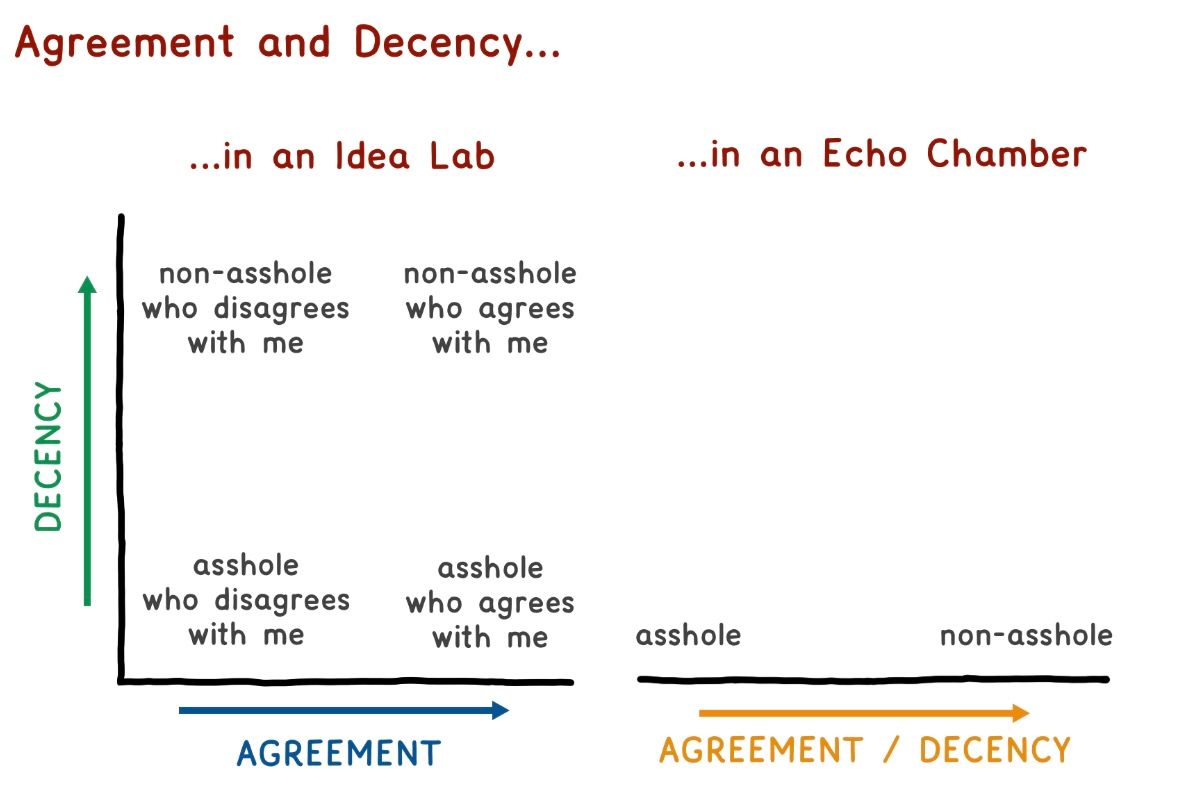On Echo Chambers and Idea Labs
This post is inspired by Tim Urban’s book, What’s Our Problem? a self-help book for societies
--
In a previous post, “on how we think,” I highlighted the idea of high-rung and low-rung thinking as a new way to examine our thinking patterns, beyond just “what we think.”
High-rung thinking allows you to freely change or reject ideas. This kind of thinking leads to growth by incorporating life experiences into new knowledge. Low-rung thinking, on the other hand, considers ideas sacred, and no evidence is enough to change your mind. Life experiences are ignored, and ideas become your master.
This distinction is important for individuals, but even more so for groups of people and their intellectual cultures. Urban defines culture in this context as “the unwritten rules regarding how we do things here.” Each of us is immersed in multiple cultures simultaneously, based on our families, where we grew up, where we went to school, where we live, and where we work.
Echo Chambers
When a group of people collectively engages in low-rung thinking, we get an Echo Chamber defined by a culture of conformity and herd mentality. Low-rung groups, like low-rung thinkers, consider certain ideas and beliefs sacred.
“In an Echo Chamber, falling in line with the rest of the group is socially rewarded. It’s a common activity to talk about how obviously correct the sacred ideas are—it’s how you express your allegiance to the community and prove your own intellectual and moral worth.” In recent years, we’ve seen Echo Chambers emerge and thrive on practically all our social platforms.
Idea Labs
It’s not all doom and gloom, though. Tim Urban goes on to describe the opposite of Echo Chambers, or what he calls Idea Labs.
“An Idea Lab is an environment of collaborative high-rung thinking. People in an Idea Lab see one another as experimenters and their ideas as experiments. Idea Labs value independent thinking and viewpoint diversity. This combination leads to the richest and most interesting conversations and maximizes the score of group discussions.” Idea Labs are where people are respected but ideas are vigorously debated.
To help us clearly visualize the difference between an Echo Chamber and an Idea Lab, here’s one of Urban’s great illustrations:

Echo Chambers view a person’s beliefs and identity as one and the same. So criticizing someone’s ideas equals criticizing them. In contrast, Idea Labs properly distinguish between individuals and their beliefs, and between decency and agreement.
What can we do with this? We not only have a new, simple way to discuss and identify different intellectual cultures but also a set of principles to aim for when trying to make each of our groups more like an Idea Lab. We can be respectful of people while embracing argumentation. We can have opinions without confusing them with our identity.
Personally, I’m hopeful that both current and new social platforms will start incorporating user experience elements that encourage and lead to behaviors that resemble an Idea Lab.